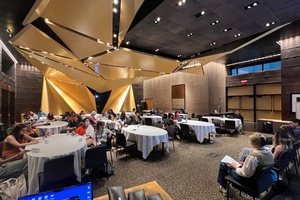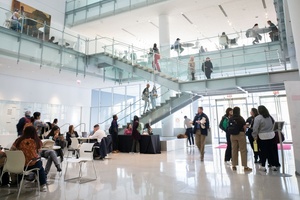Features:
How to bring new perspectives to journalism
Lessons from a pilot event that brought journalists together with civic-minded organizers and makers

traci kato-kiriyama addresses the crowd during Perspectives – Los Angeles. (Andrew Losowsky)
It started in a park. We were sitting on a bench, talking about how journalism conferences were all well and good, but we always ended up at them in a room surrounded by the same groups of people.
Meanwhile, just outside of whichever conference hotel we were sitting in, people were doing amazing things in their communities, tackling some of the same problems as journalists – misinformation, lack of engagement, injustice. Why couldn’t we talk to some of them instead?
Ideas and rants and observations sprang urgently back and forth. We should be talking to nurses and public health workers, bail reform activists and non-English speaking mutual aid groups about what they do and how they do it. We should be listening not only to their struggles but also learning from their systems and methods.
That’s how we came up with Perspectives.
Andrew brought up I Am Still Alive, a self-defined “parasite magazine” that gets around the cost of printing and distribution by creating each issue inside a different, pre-existing magazine.
Could we make a “parasite” event at a journalism conference? If so, would anyone attend?
These were our opening questions. We decided to start small – small enough that if we couldn’t find funding, we could cover the costs ourselves. We pitched to a virtual conference in Spring 2022. The organizers were enthusiastic about the idea, but didn’t see a way to fit it into their structure.
By now, we had some core principles:
- We would pay speakers, even if it had to come out of our own pockets
- We would hold a Q&A – in two directions, inviting our speakers to ask questions back to journalists about what they do and why
- Our speakers would present expertise from outside the news industry
- We would attach our events to existing journalism conferences, massively reducing both overheads and expectations of attendees
We would choose a time that fit with the conference, not compete with it.
With ONA 2022, we saw our chance. Thousands of journalists would be traveling to L.A.– confined largely to a giant conference hotel downtown. Ariel had moved to the city, so we had local connections. It was the perfect way to begin this experiment. “Perspectives – Los Angeles” was born.
Because it was unofficial, we needed to find a venue outside of the conference hotel, and since the best time for the event was breakfast time (not a huge issue given that a high number of ONA attendees came from east of California), we would provide coffee and food.
Ariel found a wonderful venue (more on that below.) OpenNews graciously gave us the money to cover the cost of the venue and to pay the speakers. KPCC/LAist’s underwriting and engagement departments helped secure a trade for breakfast. We handled all of the logistics.
At 8 a.m. on September 22nd, we introduced attendees to three different civic organizers in L.A. each of whom had important lessons to offer journalism.
- Leezel Tanglao is the chair of the COVID-19 task force for the Filipino Young Leaders Program in Los Angeles. She shared how the group created a misinformation hotline about the pandemic, targeted at Tagalog speakers in the community, especially the elderly.
- Jennifer Gutierrez is a Methodist minister and executive director of the Museum of Social Justice. She talked about the museum’s collaborations with local communities to co-tell stories in ways that are inclusive both of people and their surroundings.
- traci kato-kiriyama told us how a group of artists took over a space right outside the doors of our venue to create the Tuesday Night Cafe, the longest-running Asian American public arts series in the nation, about to celebrate their 25th anniversary in 2023.
What we learned

Andrew and Ariel introducing Perspectives LA. (Emma Carew Grovum)
Choose a venue with meaning. To be completely honest, we initially chose our venue because of how close it was to the conference hotel and because they had both an indoor and outdoor space for us. It turned out to be perfect.
The venue was East/West Players, the first Asian-American theater company in the U.S., based out of a historic building in Little Tokyo. Andy Lowe, their director of production and casting, joined us for a few minutes at the beginning of the event to share the history of the building and the area, how people lined up to be sent to internment camps outside its doors, how it was a community center to support new arrivals in the Great Migration, how the Zoot Suit Riots took place in front of its doors. His introduction centered everyone in the city’s history of struggle, and set us up perfectly for the presentations that followed.
And the stage on which our event took place was set up for their next show, meaning that our speakers sat among the trappings of a Korean-owned beauty store in South L.A.
We got a lot of positive feedback about our choice of venue. Moving forward, we will always host Perspectives in a venue outside of the main conference event, so that journalist attendees have to enter a meaningful space connected to the local community, instead of asking speakers to come into a bigger, more soulless event space.
There is an appetite for reflection, even at conferences. None of these presentations were the tactical, “Do X to achieve Y” presentations so typical of journalism conferences. We found that people embraced the opportunity to step back from daily operational conversations and reflect on how and why they do their work.
This is not a happy hour event. We were a little nervous asking ONA attendees to show up at 8 a.m., but 1) we didn’t want to compete with the dozens of happy hours happening after ONA ended each day and 2) we felt like the event required a different mindset than people are in at 6 p.m. with a glass of wine in hand.
The feedback we received from the event confirmed that these were the right decisions. Going forward we’ll opt for times that are optimized for reflection and deep conversations instead of networking.
Make more time for conversation. We heard that participants wanted more time to talk to the speakers and to each other after the presentations, to digest their learnings together. We’ll factor that into how we structure our next events.
What’s next
We’re just getting started. We couldn’t be prouder of our first event, and also we have big ambitions.
Among our goals for the future of Perspectives:
- More events, obviously, and more hosts. If you have an idea of where we should host the next event, tell us! And if you want to host your own, get in touch!
- Multiple sessions, with more interactivity. Perhaps a conference could sponsor an entire Perspectives track/day?
- A playbook for others to run similar events. We don’t want to be the only ones who do this – in our industry or others. Cross pollination of knowledge and ideas is so important.
- A more diverse organizing committee. We’re very aware of the fact that this was created by two white people who work for large organizations. If you’re interested in helping make future Perspectives happen, let us know!
If you’re organizing a journalism conference and want to bring Perspectives to it, get in touch at ariel@arielzirulnick.com and andrew@losowsky.com. And if you’re someone like us who has an idea for bringing new perspectives to our industry, we’d love to hear from you and help you make that happen, through Perspectives or on your own.
If journalism is going to remain relevant, accessible, and connected to the communities, we need to invite more perspectives into our spaces, not only around who we quote in a story, but in how we do everything.
See you at the next Perspectives.
Credits
-
Andrew Losowsky
Andrew Losowsky is the Head of Community Product at Vox Media.
-
Ariel Zirulnick
Ariel Zirulnick is the senior editor for community engagement at KPCC/LAist in Los Angeles.



